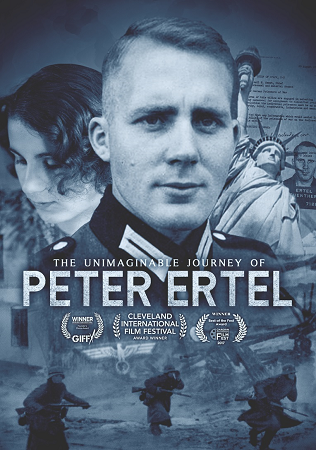
The Unimaginable Journey Of Peter Ertel 2016
Distributed by Victory Films
Produced by Samuel Hartwell, Joseph Cahn, and Mary Kay Salerno-Cahn
Directed by Joseph Cahn
Streaming, 104 mins
College - General Adult
Documentary; History; World War II
Date Entered: 10/26/2020
Reviewed by Cori Biddle, Student Engagement and Outreach Librarian, Robert E Eiche Library, Penn State AltoonaThe Unimaginable Journey of Peter Ertel is truly a remarkable telling of the life experiences of a man who was a child during the Weimar Republic, a conscripted solider in Hitler’s army, and a miraculous survivor of the Russia front and the Normandy invasion. As a POW in America, he was asked to serve as an agent of the US State Department and helped to rebuild German’s democracy after the war. Immigrating to America in the 1950s, he spent the rest of his working like employed for a company run by Orthodox Jews.
This film is narrated by Ertel himself, giving it a personal and intimate feel. Most of the film focuses on his experiences as a soldier during World War II and demonstrates the complexities of German society during the rule of Hitler. Ertel, his wife and in-laws were marked as anti-Nazis by the government, but he was still forced to serve the army, and had to fight to stay alive in some of the most brutal conditions of the war. Many times in his story he illustrates ways that he defined orders or falsified reports as ways to keep himself and the men around him alive. He even speaks of how he purposefully looked to be captured by the Americans in Normandy. His experience as a POW and his recruitment to help rebuild German democracy after the war (which is spoken of little in the film) helped frame his thoughts of America and led to his immigration to the United States in 1953. One feels like the experiences of Peter assisting the State Department in rebuilding Germany would have been just as noteworthy as his war experience, and probably would have taken up another entire documentary in of itself.
The film mainly uses footage of an interview with Ertel, along with archival material from German, Russian, and British sources to illustrate the conditions he experienced on the front lines, and in the POW camps. Other places, like when he is captured by Americans in Normandy, the film uses re-enactments or stock footage which feel a bit jarring and out of place to the viewer. Overal, the filmmakers did a good job of using photos and film footage to enhance Ertel’s story.
Though Ertel himself states that the Nazis strived for an army full of “obedient robot[s],” this story is a powerful example of how German soldiers and civilians were not a homogenous group of Nazi supporters. It is important to save and share these unique experiences in order to build a more complicated, but more truthful, view of Germany under Nazi rule.
The other layer of Peter Ertel’s story, the life he built in the United States, and his career as part of a company run by Orthodox Jews, speaks to the wonderful potential in humanity for forgiveness and reconciliation. Towards the beginning of the documentary Ertel comments that what makes America great is the tolerance displayed between different groups of people. A remark that seems to resonate now more than ever in our current polarized climate. This film is highly recommended.
Awards:
2017 Chagrin Documentary Film Festival David Ponce Best of the Fest Award; 2016 GI Film Festival Founders' Choice Award; 2017 Cleveland International Film Festival Local Heroes Competition.